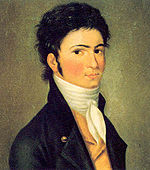Essay--Beethoven's 5th & Anger Management
We all feel angry or frustrated at times. I don't believe in suppressing anger/frustration and speaking through a tight fake smile. I also don't feel that it is appropriate to vent anger, to rant, and to take out anger on other humans and creatures.
When we feel angry we can listen to music that matches our frustration level to help us release it safely and sanely. We could use movement with the music, have a good cry, scream into a pillow (though some psychotherapist and metaphysicians frown on this practice), or just sit and listen to the music, allowing it to move you through your feelings.
Don't focus on what sparked your anger/frustration since that's like adding oil to a fire. Focus on the emotions you feel and don't judge them. Go as deep as you can within yourself and see where those emotions take you.
While I'm sure you know of plenty of music that can go to that angry place with you, how about music that starts in that place of frustration/helplessness and eventually leads you to a triumphant place? Beethoven's 5th Symphony does just that.
I've written a lot about this symphony on WME for good reason. I've listened to the symphony myself when working through darker emotions and found it effective. Here is the breakdown on the symphony's 4 movements to give you ad idea of its powerful therapeutic effect.
First Movement---Fate knocking on the door. Da, da, da, daaa, da, da, da, daaa, sounds angry doesn't it? And the tension keeps building from that opening phrase. Fate knocking on the door comes for a reason. Perhaps that fate comes in the form of illness, an accident, a job loss or something else that takes you to your edge. You find yourself alone looking in the mirror and at first you might not recognize yourself staring back. Time to become acquainted with the real you and what makes you tick.
But hold on, just like Joseph Campbell's warrior's journey, will the hero answer the call? In this case, you are the hero and an event or circumstance beckons to you to see what you're made of. Will you walk in integrity as you're pushed to the edge or will you just blow up and cause more damage to yourself and others?
The First Movement offers the choice between throwing a trantrum or sharpening the blade of your intellect and skills. Is your heart in it? Can you stomach what fate has brought to the door? And so the First Movement ends with frenzied notes--chaos.
The Second Movement, Adante con moto, brings in the regal horns and romantic sweeping strings. This represents the part of the heroes journey when he or she has come riding out of the woods into a sunny meadow. The hero is still on the way to conquer what fate has brought to the door, but enjoys a respite. Think of the more pastoral scenes in the Lord of the Ring series, when companions get together, drink, are merry, but also realize what dangers lurk in the future.
The Third Movement, Allegro, starts out on a playful note with a gentle call and response between the horns and the strings/flutes, but you can hear tension bubbling below the surface--it's the monster hiding beneath the deep waters of the lake or the unconscious mind, the stuff where we trip ourselves up, but at the moment, we're still enjoying a dreamy or romantic distraction.
The personality of this movement reminds me of the person that says everything is okay, but he knows, and we know, everything is not okay. Why show such a brave face? Is this ego, pride, or concern for others? What is the cheerful act masking? Obviously the reason for the anger still exist and must be dealt with by this point.
And if it is dealt with, then we move on to the final movement of the symphony. This is when the hero rides his horse triumphant through the streets. The regal horns return and offer pomp and the orchestra responds with victorious declarations. The rush of notes leading to(unfortunately these runs skip on the CD I checked out from the library), a victorious conclusion, and you can feel it in every part of your body, but especially in the heart.
If you're honest with yourself and your emotions while listening to this symphony, you will be able to work through your anger. If you have deeper issues, then seeking help from a certified music therapist would assist you further on your journey towards wholeness.
I once listened to this symphony when I was searching for a new place to live. I found a possible place, but couldn't answer the knock at the door so I lost the place to someone more willing to take a risk. I felt confident after listening to the symphony and I felt that I could manifest anything, but I was surprised when I manifested my wish quickly and I didn't act on it.
Now, I realize the power behind this music and I know what it can achieve. It's not that anyone could take this popular symphony lightly, not if he or she gives it a good listen. It's as if this symphony contains every event in the composer's life, events of the past, the present, and his future (as his hearing further deteriorated). While we may never share Beethoven's fate, through his symphony we can build self-confidence, work through our anger, and emerge triumphant.




Comments
Post a Comment